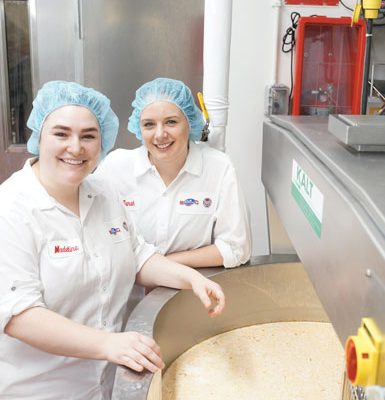By combining the cheese producing values of Switzerland and Wisconsin, Emmi Roth has become a cheesemaker to remember.
Switzerland and Wisconsin are considered two of the world’s most important cheesemaking regions, with very similar traditions and local values. That’s why the marriage of the two behind Monroe, WI-based specialty cheesemaker Emmi Roth has been such an amazing success.

“Emmi Roth was formed in 2010 when Emmi Group, the leading dairy cooperative in Switzerland, merged with Roth Käse, a Wisconsin cheese producer with Swiss roots,” says Tim Omer, who serves as Emmi Roth’s president and managing director. “We make all the traditional Roth cheeses we’ve made from the beginning and also import Emmi cheeses into the U.S. from Switzerland. Together, we’re better cheesemakers through our collaboration and sharing of expertise.”
Home to Roth Cheese, Wisconsin’s Green County is known as the Swiss Cheese Capital of America, where Swiss cheese factories line the countryside throughout the region. Each of these areas is rooted deep in tradition with access to high-quality, local milk and a landscape perfect for cheesemaking.
These were the things that drew Omer to the business, and he has had a passion for the industry for decades. He’s worked in specialty cheeses for more than a quarter of a century, most notably as CEO and president of DCI Cheese Co. in Richfield, WI.
“I’ve worked in the cheese industry for many years. One of the things that draws you into this amazing industry is the people,” Omer says. “There are very few industries that have the passion and collaboration you find in cheesemaking. There is grit and art to the cheese industry, and it’s exciting and rewarding to be part of.”
A Storied History
In 1911, Otto Roth came to the United States from Switzerland to open Otto Roth & Co., a business where he imported Swiss cheeses into America. By 1990, the company transformed into Roth Käse USA and was scouting locations to make its own cheese in the U.S.
Initially, the city of Monroe, WI was chosen due to its access to high-quality milk, existing cheesemaking infrastructure and the strong Swiss heritage of the region. This was also the place where the first-ever copper vat was utilized to create cheese in the U.S., and spruce boards were used in the aging process. Both of these storied traditions are still followed today, as Emmi Roth crafts Roth Grand Cru and other signature Roth cheeses.

In 2009, Emmi, the Swiss dairy cooperative, purchased Roth Käse USA to form Emmi Roth, making Roth cheese in Wisconsin and importing Emmi cheeses from Switzerland to the U.S.
When Matthias Kunz, Emmi Roth USA’s chairman of the board, announced the hiring of Omer as the company’s president and managing director in 2014, he cited the cheese industry vet’s “deep and thorough knowledge” as being instrumental in helping the company continue to grow.
And grow it has. The company has been able to expand from just one creamery to now five locations in the state, including three cheesemaking facilities, a distribution center and a home office—growing its capacity to make cheese and employ some of the most passionate people in the industry.
“Roth started out as a small cheese company in Wisconsin. But now, as part of Emmi Group, we’re able to scale our production and growth,” Omer says. “We’re able to balance the production of hand-crafted artisanal cheeses with everyday specialty cheeses, allowing us to remain financially viable and support our most important asset, our people.”
When Emmi Group and Roth Käse merged to become Emmi Roth, the process went smoothly, but not without growing pains. As many cheese companies have and are experiencing, growth doesn’t come without challenges.
“Our team in Wisconsin learned, and is still learning, to work within a global company, which comes with many advantages, but also is learning how to work with new cultures and expectations,” Omer says. “Our other ongoing challenge is explaining our company to the industry. Our company name is Emmi Roth, but that’s not the name of our cheese brands.”
To consumers, the company sells Roth branded cheese from Wisconsin, Emmi branded cheese from Switzerland and also represents other small cheese brands. That can create a challenge to continue to tell this story to customers and the industry.
“We appreciate our legacy and history, but we now think more and more about customers and consumers, and how they interact with our products,” Omer says. “We want to make products that cheese experts and connoisseurs love, but also produce cheeses for the average consumer that are humble and attainable.”


To do that, the company often uses data to make important decisions, whether it’s market data or better data collection and analysis to make operating decisions in all of its creameries.
“We also have an understanding today that technology has fundamentally changed the consumer path to purchase,” Omer says. “We’re prioritizing digital efforts, social engagement and e-commerce, as cheese buying and consumption evolves. We want to be at the forefront of all of these changes.”
Award Winning Portfolio
Today, Emmi Roth’s portfolio includes cheeses from two distinct cheesemaking regions with very similar traditions and local values—the handcrafted award-winning Roth cheeses from Wisconsin and Emmi’s full range of traditional varieties imported from Switzerland.
“In 2015, we welcomed Kindred Creamery to the Emmi Roth family, a new line of cheeses made in Wisconsin,” Omer says. “Kindred Creamery products range from Cheddars to unique Jacks like Mango Fire Jack and Ghost Pepper Colby Jack.”
Emmi Roth is primarily known for its aged, washed rind cheeses, which it sells as Grand Cru under the Roth brand and imported Le Gruyère AOP through Emmi.
“On a company level, we hope to be known for being truly innovative and meeting the needs of our customers—making exceptional cheese products that drive growth in specialty cheese for our customers and making Emmi Roth a great place to work,” Omer says. “We hold more than 200 awards for our cheeses, and we’re proud of every single one.”
In 2019, the company won five awards at the American Cheese Society competition, including a first place prize for its Gorgonzola in the “Rindless Blue-Veined – Made from Cow’s Milk” category. The Gorgonzola is handcrafted at its new Seymour, WI, location.
Roth GranQueso took second place in the Hispanic & Portuguese Style Cheeses category, thanks to a mix of deep, intricate flavors of candied pineapple and brown butter, which has made it an American Cheese Society winner for 16 straight years.
The company also won third place awards for three other Roth brand cheeses.
Still, Omer says winning the 2016 World Championship Cheese Contest for its Roth Grand Cru Surchoix was one of the most memorable moments throughout the years.
“The excitement of that moment is still alive with our team today,” he says. “It was the first time an American cheese had won that title in more than 30 years, and we are still smiling from that moment.”
At Emmi Roth, Omer notes it has one of the most dynamic, diverse and talented teams he has ever worked with in his career.
“They continue to lead the industry with innovation, seek ways to work smarter, celebrate each other and put so much passion into the cheeses we create every day,” he says. “With five locations, each has their own energy and talents, and it’s amazing to be part of.”
As it plans for the years ahead, those in charge of Emmi Roth are looking to be the leading specialty cheese company in the U.S., and continue to grow.
“That’s important, but we want to grow by also being stewards of our communities—through sustainability efforts, supporting local charities, making traditional cheeses and empowering our employees. There’s a place for all of that, and we’re already seeing our ability to do it all,” Omer says. “We have to be willing to take chances, hire the right people, lead our decisions with data and evolve as customers and consumers change.”
Back to its Roots
Those measures start all the way back in Switzerland, where it only buys Swiss milk bearing the “Suisse Garantie” (Swiss guarantee) label. To bear this label, the milk must come only from producers who meet the requirements for sound environmental practice certification, such as satisfactory manure balance and the maintenance of environmentally valuable land.

“Our Wisconsin milk is sourced from Rolling Hills Co-Op right in our backyard in Monroe,” Omer says. “There, Wisconsin dairy farmers follow the National Dairy Farmers Assuring Responsible Management (FARM) Program. This program raises the bar for the entire [U.S.] dairy industry, which in turn creates a culture of continuous improvement.”
The company is also doing what it can to reduce its carbon footprint. It recently built an anaerobic digester at its plant in Platteville, which converts any waste into renewable energy.
“The new home for our waste water is crucial to our efforts in reducing our impact on the local community, the environment and natural resources,” Omer says. “In the specialty cheese industry, we’re a big company, and we produce a lot of cheese, but we still have small company values and people who protect our heritage and tradition. Although we’re innovating new products, we’ll continue to grow and look forward to a sustainable future.”





